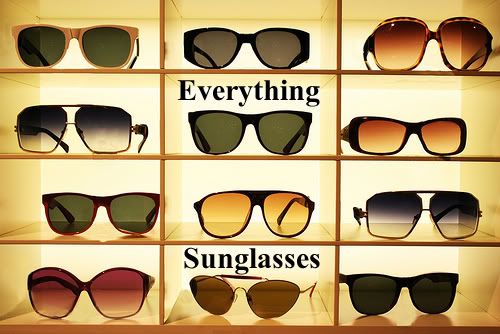Wednesday, April 23, 2008
What Actually is Polycarbonate?
Do you like this story?
Polycarbonate is the most commonly used material to make lenses. Many of the top brands (Oakley, Rudy Project, Uvex, etc.) use it in at least some of their models. Basically, polycarbonate is a fancy word for plastic, but not your average plastic. The reasons for its usage are many. It definitely sounds a lot better than "plastic", especially when you are talking about sunglasses. It at least sounds stronger.
(For the chemists among us)
But this is far from the reason that many brands use polycarbonate for their lenses. The main reasons are that it is impact resistant, transparent, thermally stable (won't burn easily), lightweight and perhaps most importantly, UV resistant.
All of these reasons can account for their popularity in sunglasses, but impact resistance is especially important for sports sunglasses. In the case of extreme sports, impact resistance can be the difference between an eye injury (or worse) and broken lenses. This is an advertising point for a lot of brands actually, and a lot of them have really fancy (i.e. over the top) names for lens materials, most of which are polycarbonate.
Transparency and the ability to manipulate the color of lenses make polycarbonate a substance for use in sports and fashion eyewear.
UV resistance is the key reason for polycarbonate being used in sunglasses in general. Over time, UV rays can harm your eyes and cause irreparable damage. Sunglasses are first and foremost for protection, and polycarbonate itself blocks UV, no extra coatings or treatments are needed, making it ideal.
Scratching is a problem with polycarbonate, and one of its only weaknesses. It is resistant to scratching, but not to a great extent. If you put your sunglasses through a really good end-over-end spill, your lenses (and probably your spine) are going to be rough looking after. This is made worse ten fold if you have mirrored lenses, which I'll talk more about in the future. This is one of the places where glass lenses have an advantage, being a lot less likely to get scratched for minor drops.
If you are going to buy sunglasses, whether it be for fashion or sports, make sure your lenses are at least made from polycarbonate. Do not trust other plastics. Be especially careful when buying fashion sunglasses, as they often use cheaper plastics to save cost.
References:

This post was written by: Sunglasses Guy
The Sunglasses Guy is a shallow but driven blogger who knows the ins and outs of the eyewear industry. Get ahold of him via e-mail or his Twitter


6 Responses to “What Actually is Polycarbonate?”
May 4, 2008 at 8:27 AM
So how does "Plutonite" from Oakley fair compared to polycarbonate? Is it the same?
May 4, 2008 at 9:59 PM
Hi Andy,
Good question. Frankly speaking, every brand has a special name for polycarbonate and Oakley's happens to be Plutonite. All polycarbonate lenses filter out UV rays naturally, so it's not special technology, they do it on their own.
There could be differences, however, in the purity of polycarbonate, but no company publishes how pure theirs is and if they pass the ANSI standards, then it is really pure and the difference between individual companies is small.
May 13, 2008 at 4:14 PM
How sturdy are lenses made of tempered glass? A lot of Ray Ban sunglasses are made of tempered glasses. Are they supposed to be extremely impact resistant, on top of being scratch resistant?
May 13, 2008 at 8:11 PM
Xiao,
Thanks for stopping by.
Tempered glass (or safety glass) is made by rapidly heating and cooling glass. It becomes about 4 times harder than everyday glass. So, it is impact resistant, but everything is. Polycarbonate is often over 40 times stronger than glasses, so it is definitely more resistant.
However, if you are buying something like RayBans (which I love), it won't be a problem, as I don't think you will be wearing them to go white-water rafting.
May 14, 2008 at 7:02 AM
I bought a pair of Ray Ban a couple of days ago but had to turn them because the frame couldn't stay on my nose. it kept slipping off my nose. Being Asian and having a relatively flat nose ridge is a big problem. On top that, Ray Ban's use of tempered glass makes the sunnies heavy...
Oh, btw, do you know if major sunglass brands make sunglasses in Asian fitting to cater to Asian people's facial structures? I've heard (though not sure) that for the same models of sunglasses, Safilo makes two fittings--the regular, european fitting sold in Europe, America, etc. and the fitting sold in Asia. You know, Asian faces tend to be more flat, but European fitting sunglasses tend to be really curved and often touch Asian people's cheeks when they wear them.
May 15, 2008 at 7:35 AM
Xiao,
I know what you mean. You really need to fit the right fit.
As for brands, it is tough to say. Oakley has an "Asian Fit", for many of their models, as do Bolle and Nike. There may be others.
Post a Comment